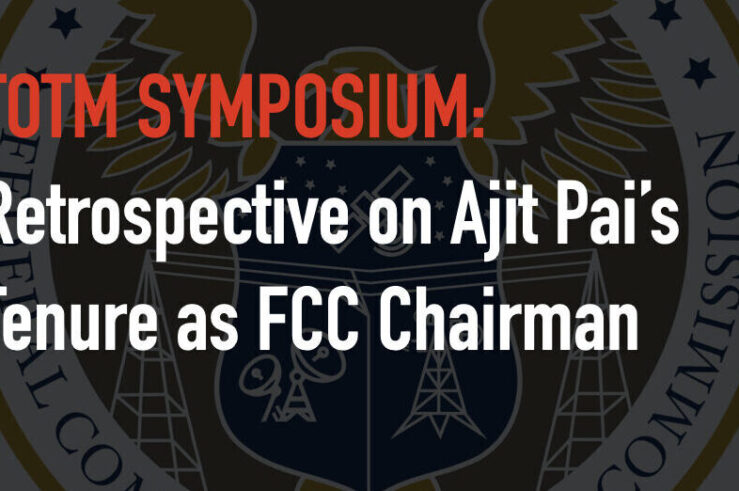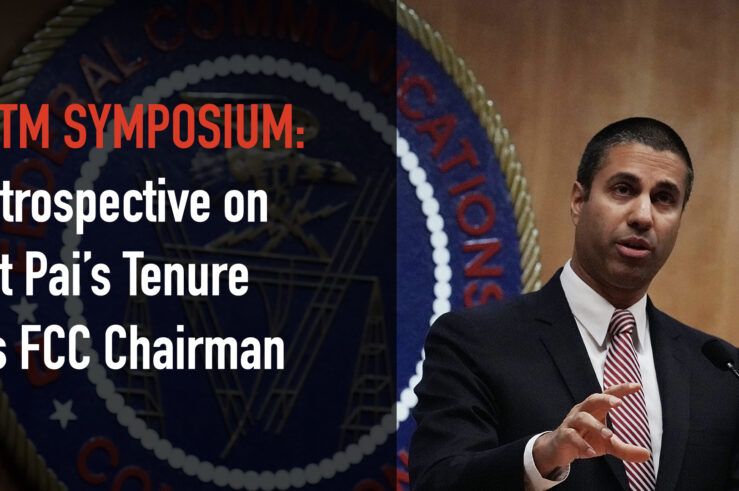Showing results for: “Google shopping manne”
Ajit Pai Brought the FCC’s Media Ownership Rules into the Modern Age
I’m delighted to add my comments to the chorus of voices honoring Ajit Pai’s remarkable tenure at the Federal Communications Commission. I’ve known Ajit longer than most. We were classmates in law school … let’s just say “many” years ago. Among the other symposium contributors I know of only one—fellow classmate, Tom Nachbar—who can make ... Ajit Pai Brought the FCC’s Media Ownership Rules into the Modern Age
Chairman Pai’s Legacy of Transparency
For many, the chairmanship of Ajit Pai is notable for its many headline-grabbing substantive achievements, including the Restoring Internet Freedom order, 5G deployment, and rural buildout—many of which have been or will be discussed in this symposium. But that conversation is incomplete without also acknowledging Pai’s careful attention to the basic blocking and tackling of ... Chairman Pai’s Legacy of Transparency
A Reflection on Commissioner Pai, Chairman Pai, and Public Service
Much of this symposium celebrates Ajit’s contributions as chairman of the Federal Communications Commission and his accomplishments and leadership in that role. And rightly so. But Commissioner Pai, not just Chairman Pai, should also be recognized. I first met Ajit when we were both minority commissioners at our respective agencies: the FCC and Federal Trade ... A Reflection on Commissioner Pai, Chairman Pai, and Public Service
Chairman Pai’s FCC Followed a Sound Process in Approving L-Band Wireless Services
During Chairman Ajit Pai’s tenure, the Federal Communications Commission adopted key reforms that improved the agency’s processes. No less important than process reform is process integrity. The commission’s L-Band Order and the process that produced it will be the focus here. In that proceeding, Chairman Pai led a careful and deliberative process that resulted in ... Chairman Pai’s FCC Followed a Sound Process in Approving L-Band Wireless Services
The (Conventional) 5G Chairman
Chairman Ajit Pai prioritized making new spectrum available for 5G. To his credit, he succeeded. Over the course of four years, Chairman Pai made available more high-band and mid-band spectrum, for licensed use and unlicensed use, than any other Federal Communications Commission chairman. He did so in the face of unprecedented opposition from other federal ... The (Conventional) 5G Chairman
Why Restoring Internet Freedom Was a Landmark Accomplishment
I am pleased to participate in this retrospective symposium regarding Ajit Pai’s tenure as Federal Communications Commission chairman. I have been closely involved in communications law and policy for nearly 45 years, and, as I’ve said several times since Chairman Pai announced his departure, he will leave as one of the most consequential leaders in ... Why Restoring Internet Freedom Was a Landmark Accomplishment
Great Job, Kid! (And Welcome to the Private Sector)
Many thanks to Geoffrey Manne for this opportunity to memorialize a few thoughts I have about Ajit’s service on the Federal Communications Commission. My remarks will be more about Ajit as a person rather than the substance and long laundry list of his accomplishments as chair. Others will do that, I’m sure. The first memory ... Great Job, Kid! (And Welcome to the Private Sector)
Retrospective on Ajit Pai’s Tenure as FCC Chairman
As we ponder the changes to FCC policy that may arise with the next administration, it’s also a timely opportunity to reflect on the chairman’s leadership at the agency and his influence on telecommunications policy more broadly. Indeed, the FCC has faced numerous challenges and opportunities over the past four years, with implications for a ... Retrospective on Ajit Pai’s Tenure as FCC Chairman
The DOJ’s Antitrust Case Against Google: A Tough Slog, but Maybe an Intriguing Possibility?
The U.S. Department of Justice’s (DOJ) antitrust case against Google, which was filed in October 2020, will be a tough slog.[1] It is an alleged monopolization (Sherman Act, Sec. 2) case; and monopolization cases are always a tough slog. In this brief essay I will lay out some of the issues in the case and raise ... The DOJ’s Antitrust Case Against Google: A Tough Slog, but Maybe an Intriguing Possibility?
COVID-19 Vaccines Show the Patent System Works
With the COVID-19 vaccine made by Moderna joining the one from Pfizer and BioNTech in gaining approval from the U.S. Food and Drug Administration, it should be time to celebrate the U.S. system of pharmaceutical development. The system’s incentives—notably granting patent rights to firms that invest in new and novel discoveries—have worked to an astonishing ... COVID-19 Vaccines Show the Patent System Works
Trade Promotions in High Tech
As one of the few economic theorists in this symposium, I believe my comparative advantage is in that: economic theory. In this post, I want to remind people of the basic economic theories that we have at our disposal, “off the shelf,” to make sense of the U.S. Department of Justice’s lawsuit against Google. I ... Trade Promotions in High Tech
Why the Federal Government’s Antitrust Case Against Google Should—and Likely Will—Fail
On October 20, 2020, the U.S. Department of Justice (DOJ) and eleven states with Republican attorneys general sued Google for monopolizing and attempting to monopolize the markets for general internet search services, search advertising, and “general search text” advertising (i.e., ads that resemble search results). Last week, California joined the lawsuit, making it a bipartisan ... Why the Federal Government’s Antitrust Case Against Google Should—and Likely Will—Fail








